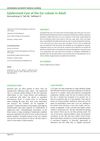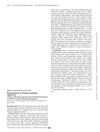 11 citations,
May 2003 in “Obstetrics and gynecology (New York. 1953. Online)/Obstetrics and gynecology”
11 citations,
May 2003 in “Obstetrics and gynecology (New York. 1953. Online)/Obstetrics and gynecology” Hirsutism in women often indicates a hormonal imbalance and can be managed with a combination of hormonal treatments and hair removal methods.
54 citations,
June 2006 in “Baillière's best practice and research in clinical endocrinology and metabolism/Baillière's best practice & research. Clinical endocrinology & metabolism” Medicines that lower androgen levels and hair removal treatments help manage excessive hair and acne in women with PCOS.
 12 citations,
May 2005 in “Current obstetrics and gynaecology/Current obstetrics & gynaecology”
12 citations,
May 2005 in “Current obstetrics and gynaecology/Current obstetrics & gynaecology” Hirsutism is too much hair growth in women like the pattern in men, often caused by high male hormones, and can be treated with hormone control and hair removal methods.
 11 citations,
November 2017 in “Hong Kong Medical Journal”
11 citations,
November 2017 in “Hong Kong Medical Journal” Polycystic ovary syndrome increases the risk of diabetes, heart disease, and endometrial cancer, and requires early treatment to manage these risks.
 November 2022 in “Journal of the Endocrine Society”
November 2022 in “Journal of the Endocrine Society” Removing the ovarian tumor improved the woman's hormonal symptoms.

PCOS is a complex condition that can lead to serious health issues, but early diagnosis and treatment can reduce these risks.
 17 citations,
May 2012 in “Clinical Endocrinology”
17 citations,
May 2012 in “Clinical Endocrinology” Surgery to lower high testosterone in postmenopausal women with certain ovarian tumors doesn't significantly affect their metabolism.
 88 citations,
May 2012 in “Human Reproduction Update”
88 citations,
May 2012 in “Human Reproduction Update” Women with PCOS may take longer to get pregnant but can have a normal family size, and should manage their overall health to reduce long-term health risks.
 6 citations,
April 2018 in “Obstetrics, gynaecology and reproductive medicine”
6 citations,
April 2018 in “Obstetrics, gynaecology and reproductive medicine” Most women with hirsutism have it because of PCOS, and they need long-term treatment including medication and hair removal to improve their condition.
 March 2022 in “Practical Diabetes”
March 2022 in “Practical Diabetes” Hair conditions can be linked to diabetes and affect psychological health.
 2 citations,
March 2016 in “InnovAiT”
2 citations,
March 2016 in “InnovAiT” PCOS is a common hormonal disorder in women, often involving menstrual issues and increased diabetes risk, managed through lifestyle changes and targeted treatments.
 195 citations,
May 2003 in “Obstetrics and gynecology (New York. 1953. Online)/Obstetrics and gynecology”
195 citations,
May 2003 in “Obstetrics and gynecology (New York. 1953. Online)/Obstetrics and gynecology” Most women with excess hair growth have an underlying hormonal issue, often treated with medication and hair removal methods.
 6 citations,
August 2023 in “European journal of endocrinology”
6 citations,
August 2023 in “European journal of endocrinology” The 2023 guideline advises a detailed approach for PCOS, focusing on early detection, lifestyle and medical treatments, and managing health risks.
 March 2012 in “Journal of the American Academy of Dermatology”
March 2012 in “Journal of the American Academy of Dermatology” African Americans lack knowledge about laser hair removal safety, Nd:Yag laser treatment is effective with high satisfaction, pressure during surgery can cause hair loss, and treating ovarian inflammation may help with alopecia areata.
 13 citations,
July 2011 in “Photomedicine and laser surgery”
13 citations,
July 2011 in “Photomedicine and laser surgery” Coloring white hair before IPL treatment effectively helps remove it.
 373 citations,
September 2009 in “Obstetrics & Gynecology”
373 citations,
September 2009 in “Obstetrics & Gynecology” The bulletin provides guidelines for diagnosing and managing PCOS, suggesting weight loss, hormonal contraceptives, and diabetes screening, with clomiphene for infertility and various treatments for excess hair.
 467 citations,
October 2014 in “European Journal of Endocrinology”
467 citations,
October 2014 in “European Journal of Endocrinology” The European Society of Endocrinology advises individualized long-term management for PCOS, focusing on lifestyle changes, accurate diagnosis, and treatments for associated health risks and symptoms.
 22 citations,
June 2002 in “Seminars in cutaneous medicine and surgery”
22 citations,
June 2002 in “Seminars in cutaneous medicine and surgery” Laser hair removal works well for people with dark hair and light skin, but it's less effective for light hair or dark skin; improvements are expected.
 76 citations,
January 2007 in “American Journal of Clinical Dermatology”
76 citations,
January 2007 in “American Journal of Clinical Dermatology” Women with PCOS often have skin problems like excessive hair, acne, hair loss, and dark patches, which can be treated with hormonal and non-hormonal therapies.
 March 2012 in “Journal of the American Academy of Dermatology”
March 2012 in “Journal of the American Academy of Dermatology” Treating ovarian-related inflammation may help hair regrowth in women with alopecia areata.
 2 citations,
May 2012 in “Annals of Oncology”
2 citations,
May 2012 in “Annals of Oncology” Patients with advanced breast cancer and high hormone receptor levels who had surgery for ovarian/pelvic metastases lived longer, especially if they had high estrogen receptor levels.
 1 citations,
December 2021 in “Kathmandu University medical journal”
1 citations,
December 2021 in “Kathmandu University medical journal” Adult earlobe can have a benign cyst that is usually removed by surgery.
 January 2021 in “Case Reports”
January 2021 in “Case Reports” A 71-year-old woman developed male-like features due to high testosterone levels caused by a benign ovarian tumor, which was successfully removed by surgery.
 4 citations,
March 2013 in “Neuropsychiatric Disease and Treatment”
4 citations,
March 2013 in “Neuropsychiatric Disease and Treatment” A woman with anorexia and Cushing's syndrome improved after tumor removal, highlighting the need to consider hormonal issues in psychiatric conditions.
 10 citations,
May 2009 in “Cases Journal”
10 citations,
May 2009 in “Cases Journal” A woman's masculine symptoms were caused by an ovarian tumor, which improved after surgery.
 10 citations,
May 1995 in “Journal of General Internal Medicine”
10 citations,
May 1995 in “Journal of General Internal Medicine” Most women with excessive hair growth have PCOS; treatment varies and focuses on preventing new hair, with electrolysis as the only permanent removal method.
 January 2019 in “Skin appendage disorders”
January 2019 in “Skin appendage disorders” A woman's hair loss was linked to a rare hormone-secreting ovarian tumor, treated with surgery and hair loss medication.
 November 2022 in “Journal of the Endocrine Society”
November 2022 in “Journal of the Endocrine Society” A rare ovarian tumor caused high testosterone and excess hair in a woman, which was resolved after tumor removal.
 7 citations,
October 2019 in “Case reports in endocrinology”
7 citations,
October 2019 in “Case reports in endocrinology” A young woman's symptoms suggested PCOS, but tests and surgery confirmed and treated a rare ovarian tumor, resolving her condition.
 5 citations,
January 2017 in “Acta Endocrinologica”
5 citations,
January 2017 in “Acta Endocrinologica” High androgen levels in postmenopausal women may suggest an ovarian tumor, and removing it can improve heart and metabolic health.





























